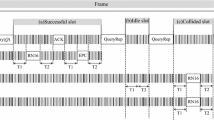Abstract
In a passive radio frequency identification (RFID) System, tags collision is caused by multiple tags communicating with the reader simultaneously, which dramatically influences the system efficiency. Therefore, researching on anti-collision algorithms to reduce the collisions and increasing the system efficiency becomes a hotspot. In this paper, we focus on the passive RFID tags and first propose a dynamical frame slotted ALOHA-based estimation method to predict the unknown population of tags. Based on this, an adjustment strategy is proposed to dynamically modify the frame size as the population of tags changes. In this adjustment strategy, a segment fashion is proposed to instead the slot-by-slot fashion; the former one could efficiently increase the reading speed and ensure the system throughput. As a result, the proposed algorithm could reach to the throughput of 35% in average with a stable estimation accuracy of 80%. The simulation shows that our algorithm also outperforms the other algorithms in the identification speed (tags/s).





Similar content being viewed by others
References
M. D. Daniel, The RF in RFID, ElsevierBurlington/USA, 2008.
Teng, J.F., Xuan, X.W., Bai, Y.: “A Fast Q algorithm based on EPC Generation-2 RFID Protocol”; Proc. 6th International Conference on Wireless Communications Networking and Mobile Computing, IEEE, (2010).
Chen, W.T.: “A Feasible and Easy-to-Implement Anti-collision Algorithm for the EPCglobal UHF Class-1 Generation-2 RFID Protocol”; IEEE Transaction on Automation Science and Engineering, 11, 1 (April 2014).
Harald, V.: “Efficient Object Identification with Passive RFID Tags”; Proc. Int. Conf. on Pervasive Computing, Zurich (2002), 98-112.
W. T. Chen, An Accurate Tag Estimate Method for Improving the Performance of an RFID Anti-Collision Algorithm based on Dynamic Frame Length ALOHA, IEEE Transactions on Automation Science and Engineering, Vol. 1, No. 1, pp. 9–15, 2009.
M. V. Bueno-Delgado, J. Vales-Alonso and F. J. Gonzalez-Castaño, “Analysis of DFSA Anti-collision Protocols in passive RFID environments,” presented at the Industrial Electronics, 2009. IECON ‘09. 35th Annual Conference of IEEE.
E. Vahedi, V. W. Wong, I. F. Blake and R. K. Ward, Probabilistic Analysis and Correction of Chens Tag Estimate Method, IEEE Transactions on Automation Science and Engineering, Vol. 8, No. 1, pp. 659–663, 2011.
Han, H., Sheng, B., Tan, C.C., Li, Q., Mao, W., and Lu, S.: “Counting RFID Tags Efficiently and Anonymously,” Proc. IEEE INFOCOM ‘10, (March 2010).
Floerkemeier, C., and Wille, M.: “Comparison of transmission schemes for framed ALOHA based RFID protocols”; Proc. International Symposium on Applications and the Internet Workshops, (2006), 97-100.
Ying, C., Hong, Z. F.: “Study on Anti-collision Q Algorithm for UHF RFID”; Proc. International Conference on Communications and Mobile Computing, (2010), 168-170.
Floerkemeier, C.: “Bayesian transmission strategy for framed ALOHA based RFID protocols”; Proc. IEEE Int. Conf. on RFID. Piscataway (2007), 228-235.
Chen, W.T., and Kao, W.B.: “A Novel Q-algorithm for EPCglobal Class-1 Generation-2 Anti-collision Protocol”; World Academy of Science, Engineering and Technology, (2011), 801-804.
H. Wu, Y. Zeng, J. Feng and Y. Gu, Binary Tree Slotted ALOHA for Passive RFID Tag Anti-Collision, IEEE Transactions on Parallel and Distribution Systems, Vol. 24, No. 1, pp. 19–31, 2013.
Acknowledgements
This research is supported by National Natural Science Foundation of China (Nos. 61472271 and 61503273), Key Scientific and Technological Projects of Shanxi Province (Nos. 20130321001-09 and 2007031129).
Author information
Authors and Affiliations
Corresponding author
Rights and permissions
About this article
Cite this article
Duan, L., Wang, Z.J. & Zhao, Q. An Efficient Slot-Segment Adjustment Strategy for Unknown Populations in RFID Systems. Int J Wireless Inf Networks 24, 42–49 (2017). https://doi.org/10.1007/s10776-016-0325-0
Received:
Accepted:
Published:
Issue Date:
DOI: https://doi.org/10.1007/s10776-016-0325-0




